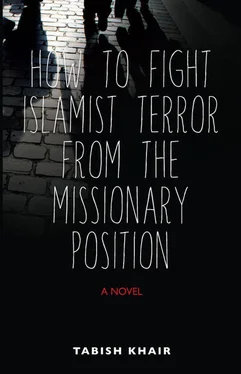“So?” I asked him.
“So what?”
“So, did your beard impede your progress?”
“By an average of two minutes and seventeen seconds—calibrated against previous non-bearded notations—per airport.”
“I don’t believe you, Ravi,” I said. “You must have done a Mr. Bean-draws-a-gun or scowled at them to attract attention.”
“But, of course, yaar, I had to make them notice my beard; I was not blessed with Karim Bhai’s hairy effulgence. And anyway, some experiments need a catalyst.”
It was one of those Sundays when all three of us were home. When relaxing in the flat, Karim went about in a long embroidered kurta and white pajamas (stiffly ironed): he sat there in this home wear, the door of his room wide open, trying to surf news channels on an old desktop that stood (covered with plastic when not in use) in a corner of his room. Ravi wore his casually expensive shorts and emblazoned T-shirt, and I was fully dressed, in jeans and a shirt: Ravi had once noted that this was what proved my professional middle-class status, that only members of the upper classes and the lower or lower middle-classes in the subcontinent wore casual or Indian clothes in company.
Karim came out of his room. He looked disgusted.
“I should buy a new computer. This one is so slow,” he said to us. We were in the kitchen, watching BBC on a small TV that Karim had installed atop the fridge. He had a slightly bigger plasma TV on a wall of his room.
“Why don’t you, Karim Bhai? They are quite cheap now and you must be minting millions with all the extra shifts you do,” Ravi replied lightly.
Karim Bhai took the suggestion seriously. He did not always get light banter.
“Oh, I am not making that much money, you know,” he said. “And I have expenses…”
He always claimed he had “expenses” but never elaborated on the nature of these.
“You can use my laptop, Karim Bhai.” Mine was plugged in on the kitchen table and it was much faster than Karim’s antique machine. We were used to such situations by now: Karim would get fed up with his slow desktop, one of us would offer him one of our faster laptops, he would refuse, as was proper; the offer would have to be repeated; he would accept with formal thanks, and spend about an hour surfing for news, mostly from India and various Muslim nations.
Those days with Tunisia, Egypt, Libya, all on the boil, he was particularly interested in the news. So were we—it was one of the sources of Ravi’s frustration with Danish universities that our students seemed unaware of what was happening. But there was an obvious difference in our interest in the events of what I preferred to call the Jasmine Revolution and Ravi, with greater skepticism, termed the Twitter Twister. Ravi and I had opinions; we were members of democratic chat groups, we signed Avaaz petitions, our Facebooks were cluttered with radical quotations. But Karim Bhai simply went to the news pages, in English, Urdu and Arabic, read them so closely that his beard touched the keyboard; he never commented on anything. If he said something, it was usually very general: “It is better today,” or “It is a bit worse, I think.”
“It is better today in Cairo,” he said, after browsing for half an hour. He brought out his pouch and started rolling himself a cigarette.
By then Ravi had taken a shower and was dressed in a selection of his best jeans, shirt and pullover. It meant he was going out to see a woman. Ravi refused to go for walks on Sundays, claiming that a Sunday walk in the woods or the parks was a deeply religious act in Denmark. His argument ran like this: Protestants had started substituting God with Nature a long time back; there is nothing more religious than a Protestant going for a walk on a Sunday; it is the Protestant version of Sunday church-going. If Ravi had to do something religious, he said, he would do it consciously and openly; he would (and sometimes did) go to church on Sundays.
As Ravi had resolutely refused to say anything about Lena after returning from London, I was curious about his sartorial efforts that Sunday, more so because he had totally stopped going out with or being visited by any of his “plain” girlfriends. But I knew better than to quiz Ravi. Despite his seeming loquacity, he could be very tight-lipped on some matters.
“You seem to follow Cairo a lot, Karim Bhai,” I responded.
“I was there, you know. Didn’t I tell you?”
“Lucky you, Karim Bhai. I wish I could go there for a long vacation,” shouted Ravi from his room. The trace of some expensive aftershave wafted from his room. Ravi had been planning to go to Cairo for years.
“No, Ravi Bhai,” Karim corrected him, “I wasn’t there as a tourist. I studied there. I did my BA in Islamic jurisprudence and Arabic from Cairo.”
Ravi entered the kitchen, shirt still unbuttoned. He was intrigued.
“Cairo, Karim Bhai?” he asked. “I did not know Indian students went to Egypt to study.”
“Some do. There are a few scholarships, mostly for poor Muslim students,” Karim explained apologetically.
Ravi looked enlightened. He turned to me and said, almost forgetting that Karim was in the room: “See, bastard, and people like us only know of scholarships to the West! Wish I had known: I could have converted and gone to Cairo!”
“It is not that different from Delhi,” said Karim Bhai dismissively. “But, you see, I have friends there, so I get a bit worried…”
“Girlfriends too, I daresay, Karim Bhai,” Ravi teased him, as he sometimes did.
Karim Bhai blushed.
“Oh no,” he said, “we got married.” I almost spilled my coffee.
“I did not know you were married, Karim Bhai,” Ravi blurted in surprise.
“Oh, didn’t I mention it before? It was such a long time back. Thirty years ago, almost…”
“And, Karim Bhai…”
“Yes,” Karim Bhai interrupted, ruminating, “twenty-six years ago…”
“But Karim Bhai,” Ravi could not restrain himself, the aunties in him were clamoring for gossip. “What happened? We have never even seen a photo of…”
“I do not take or keep photos, Ravi Bhai. You know that it is against my religion,” Karim explained. And it was true, though I doubt that either Ravi or I had noticed it before: the flat was shorn of even a single representation of a human being, animal or bird. Karim did not even seem to have a photo album in his room.
Karim Bhai was talking again: “What happened, Ravi Bhai? Who knows?” He looked at me, and at that moment we thought we understood what might have happened. “Who knows what happens to us in this world and why?” he continued ruefully.
“Only Allah-tala knows.” Then he quoted from the Quran: “Allah has knowledge of all things.”
I had once said to Ravi: if you dislike this place so much, why did you apply for a PhD here?
“I applied to Stockholm, Copenhagen and Oslo too,” he had replied. “They gave me a full scholarship here.”
“But why Scandinavia, Ravi?”
“What choice did I have, bastard? Every Tom, Dick and Hari from India goes to USA, UK, Australia or Canada for a PhD these days. Look at what it does to them! Look at yourself, yaar. And I thought, well, I had enough German, might as well pick up another language through it and see what happens to civilization when it freezes.”
I am certain Ravi was not joking when he exclaimed that he would have converted and gone to Egypt.
I recall that Sunday for two other unusual happenings. Both of them involved women and Karim Bhai, which was unusual in itself. Isn’t that one of the twists of life? You spend weeks in the flat of a man who seems to have no relations with women, who does not even allow himself to sit alone in a room with a woman, and the day he reveals that he had once been married is also the day when he has intimate meetings with two other women? Oh, I am exaggerating: the intimacy was only of the emotional sort.
Читать дальше












